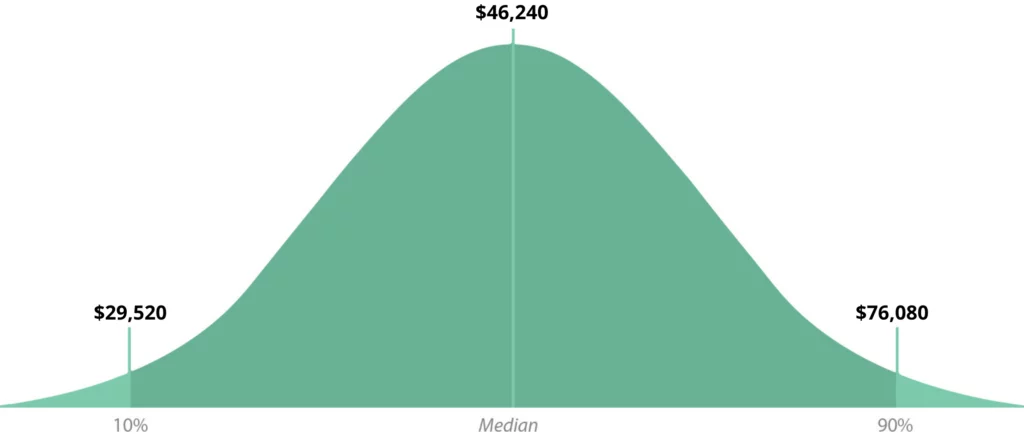
1. Overview: Job Responsibilities, Salary, and Common Requirements
2. A Comprehensive Guide to Becoming a Mental Health Counselor
3. What Does a Mental Health Counselor Do?
4. Signs You Should Consider Becoming a Mental Health Counselor
5. How Do You Become a Mental Health Counselor?
6. What are the Knowledge and Skills Needed to be a Mental Health Counselor?
7. Popular Schools and Colleges in the U.S. for Aspiring Mental Health Counselors
8. How to Get a Job as a Mental Health Counselor
9. Learn About Geographic and Location Pay Differentials
10. Make Your Resume Stand Out
11. Ace Your Mental Health Counselor Interview
12. Top Online Courses for Aspiring Mental Health Counselors
Mental health counselors made a median salary of $46,240 Mental Health Counselor in 2019. The best-paid 10 percent made $76,080 that year, while the lowest-paid 10 percent made $29,520. You can make more if self-employed, but it may take some time to start making anything substantial. Also, you must have some basic business management knowledge and leverage an EHR system for mental health providers to make your business management efforts straightforward.

Marriage and Family Therapists
Physicians and Surgeons
Probation Officers and Correctional Treatment Specialists
School and Career Counselors
Social and Community Service Managers
Rehabilitation Counselors
Social and Human Service Assistants
Active listening skills
Critical thinking skills
Judgment and decision-making skills
Complex problem-solving skills
Knowledge in Psychology
Therapy and counseling
Interpersonal skills
Mental health is essential in every aspect of our lives. It affects not only how we think but how we feel and act as well. Our mental health also determines how we make choices, how we handle stress, and how we make connections with others.
There are many factors that contribute to mental health issues. Although the causes of mental illness are not known, there is already published research that shows that the common root of this condition is a combination of biological, psychological, and environmental factors.
According to the National Alliance on Mental Illness (NAMI), suicide is the 2nd leading cause of death among people aged 10-34. Each year, millions of Americans are affected by mental illness. Studies also show that:
A mental health counselor helps people who are going through mental, behavioral, and emotional problems to achieve mental health and emotional wellness. They also offer psychological care for people who are dealing with substance abuse, depression, and unhealthy relationships.
Mental health counselors provide support to individuals, couples, groups, and families. This is by encouraging them, helping them establish goals and action plans, and approaching mental health treatment in a holistic approach rather than viewing it as an illness. They often see their patients as part of their treatment plan and specialize in different areas, such as addiction, trauma, marriage and family therapy, and career counseling.
The job of a mental health counselor involves more than just providing therapy to patients. Besides clinical tasks, you may also have administrative responsibilities. For example, if you are running your own practice, you may need to work with financial advisors to optimize your revenue and tax strategy.
What’s more, you’ll need to work with your patients to ensure that the services provided are affordable to them. To do so, you may remind them to check their policy’s therapy coverage or suggest that they switch to a more comprehensive insurance solution. Alternatively, payment plans provided by your own clinic can help patients afford therapy without relying on insurance coverage. Be sure to understand this aspect of working as a counselor before setting off on this career path.
Do you think you have what it takes to become a mental health counselor? If you think you can become one, here are some of the essential qualities that you will need.
People share their secrets and problems with you because you are a good listener. You show genuine interest in what they are trying to communicate by maintaining good eye contact, exhibiting positive body language, showing empathy, and respecting confidentiality. This skill is important when it comes to counseling. When you are a good listener, people trust you more, feel more encouraged, trust what you say, and respect your words of advice.
You are good at interacting with people from all walks of life. Also, you feel energized with emotional exchanges and always feel intrigued by people’s backgrounds. You know how to deal with people that even if they are going through challenges and demonstrating anger or hopelessness, you are still motivated to continue the conversation and help them. Instead of showing sympathy, you show empathy because you know that it will encourage a person to overcome any challenges.
You are interested in what makes people tick. You are fascinated because humans are interesting and complex creatures. Also, each human being is wired differently and has a unique insight into the world. This attribute is not unusual for mental health counselors. In fact, they are required to be interested in the human mind and discover why they behave and act a certain way.
You put your friends or family first because you are a thoughtful person. It is natural for you to help other people, and you are not expecting anything in return. Being able to help others recharges you and gives a boost to your self-esteem. You are unselfishly concerned for the happiness and well-being of others. You cannot help it but to help people when you see them in desperate circumstances.
You have also experienced dealing with your own mental, behavioral, or emotional problems. Because of that experience, you have been awakened by considering to become a mental health counselor. Your battle with these problems helps you relate yourself to what other people are feeling and going through. You are also more inspired to share what you have learned with patients and empower them that they can get through this and to fight these problems.

If you think that a mental health counselor’s job is just easy because you thought that they just need to listen to their patients’ problems and give pieces of advice—you are somewhat wrong.
The path to becoming one may be easy for some, especially when they possess all of the attributes and characteristics of a successful mental health counselor. However, becoming a mental health counselor is not a walk in the park. You need to go through a rigorous amount of education and examination for you to become licensed and perform mental health counseling. Here are the steps that you could follow.
This is the first and vital step if you want a career in mental health counseling. This is because you need to have a master’s or doctoral degree in counseling or psychology for you to get qualified to have a license and practice in your state. Therefore, the foundation for graduate studies in counseling is by obtaining a bachelor’s degree in counseling or psychology.
Some schools offer a bachelor’s degree in counseling. However, if this bachelor’s degree is not available to the school of your choice, then you can pick a related bachelor’s degree, such as psychology, education, social work, and any related field. The coursework usually includes:
A master’s degree in mental health counseling is your best choice for you to have a license and practice in this profession. The Council for Accreditation of Counseling & Related Educational Programs (CACREP) has a list of accredited programs for mental health counseling degrees. You can go to their directory to find accredited programs and the location of the institution or school.
Gaining hands-on experience under a licensed professional counselor is a key aspect of a counseling master’s degree program. As part of postgraduate requirements, aspiring mental health counselors must go through an internship to complete the master’s degree program. This activity allows students to apply classroom-learning into the real-world work experience. However, these are not usually paid experiences, although there are some internships that are paid if they require you more time and work requirements.
For you to obtain state licensure and become a full-fledged professional mental health counselor, you must first pass the counseling examination. The requirement for licensing examination may vary from state to state. To view what requirements you need to take the license exam in your state, visit the state professional counselor licensure boards.
Most states usually require counselor exams for licensure in either or both of the following:
There are also some states that require aspiring mental health counselors to pass the Clinical Rehabilitation Counselor Examination (CRC Exam) if they are interested in working with patients with mental, physical, developmental, or emotional disabilities.
Although it is not mandatory, you may also pursue to obtain national certification through:
This is a great way to boost your career, professional development, and marketability for advancement as a mental health counselor. It also demonstrates that you are committed to the counseling profession.
Successful mental health counselors typically possess specific attributes and skills. These skills may be acquired during education or training, while other skills are developed throughout a person’s life. Here are the primary skills that you should possess and develop in mental health counseling.
Active listening helps you fully understand what a person is actually saying in any conversation or meeting. It involves you to be attending so you can focus on analyzing what is going inside the person’s mind for you to come up with a response that has substance. Genuinely listening to people makes them feel appreciated, respected, and worthy.
When you give a person your full attention at a conversation, they will respond to you positively, become more relaxed, and tend to be more open about their thoughts and feeling. This is very important during a discussion or treatment with a patient.
Some patients during the first few sessions might be uncomfortable because they are new with therapy, and they don’t know you that well. Interpersonal skill is important because you can use this skill to interact and communicate with people. You will also help your patients feel comfortable during the therapy sessions so that they will convey confidence and become honest with what they are going through.
Critical thinking is the ability of a person to make a reasoned judgment by analyzing the information. A person who has this skill can clearly understand the connection between ideas and rigorously question these ideas and theories to solve problems systematically. Critical thinkers use logic in approaching and solving problems instead of assumptions.
Mental health counselors should have knowledge about the human mind and behavior performance. This is an important knowledge because mental health includes psychological, emotional, and social wellbeing. They can provide the right diagnosis and treatment to patients as they know how to take a comprehensive psychological assessment.
Mental wellness of a person can be improved with therapy and counseling treatments could help a person who is experiencing mental, behavioral, and emotional problems. This treatment is usually performed by talking to a patient about their problems and how they can deal or handle a situation that is bothering them. There are different kinds of therapy and counseling, which usually include:
Finding the right school for you to get the proper education in preparation for your career can be stressful and overwhelming. There are a lot of things that you should consider, plus there are hundreds of schools that offer mental health counseling degrees. If you are going to visit the CACREP directory, you will find out that there are over 800 schools that are offering accredited programs in mental health counseling.
Here is a list of the popular colleges for aspiring mental health counselors to help you narrow down your search.
Best colleges with mental health counseling/counselor degrees, according to Universities.com.
Best graduate degree program according to online psychology degree.

With thousands of job postings, it can be quite a challenge to find a job in the U.S. Here are some tips on how you can find a job.
Using job search engines is one of the easiest ways to find a job. You can refine your job search only to find jobs you are interested in and find a lot of job listings. Below is a list of the top used job search engine sites.
Joining professional associations helps connect mental health counselors with mentors, peers, and other leaders in the industry. This also gives them an opportunity to meet and build their network. If they want to get ahead and find more opportunities in mental health counseling, then you need to join in either of these following professional associations in the U.S.
Geographic areas often have location pay differentials, making a significant impact on your potential earnings. Some states offer a higher salary and some with a lower wage to mental health counselors.
Here’s a list of the average mean of annual revenues of mental health counselors in every state according to the latest data from the Bureau of Labor Statistics’ Occupational Employment Statistics dated 2019:
Report from the Bureau of Labor Statistics
Tailoring your resume so that it will catch the attention and impress hiring managers is the first step of getting invited to an interview. In this section, you will learn tips on how you can create a robust mental health counselor resume.
If you send a mediocre resume to an employer, it will most likely not catch their attention. They want to know if you have read their job posting and if you are the applicant they are looking for.
The key here is to review the job listing and make a few tweaks to your resume based on the skill and experience they want a candidate to have. You should also find out their company mission and vision, and incorporate those to the professional objectives of your resume. Also, you should be honest on the information that you put in your resume. Don’t add experiences or skills that you don’t really have.
Most recruiters or employers use an applicant tracking system (ATS) during their hiring process to scan, filter, and track job applications. The ATS analyzes resumes by allowing recruiters or employers to search for keywords. Here are the top keywords that you can use in your resume for the mental health counselor position:
A professional statement should be on the top of your resume after your name and contact details. It is an important part of a resume because you will use this short statement to grab the attention and impress your potential employer. You may use the following as a guide in writing your professional statement.
Since resumes should only be short and as much as possible in one page only, adding a cover letter will help to backup or supplement your resume to briefly discuss your qualifying skills and experiences.
Your resume should not have typos, grammar mistakes, and spelling mistakes. Employers will not be impressed if your resume is full of mistakes. By doing this, you are demonstrating that you are meticulous, and you have a strong attention to detail.
The next step is to prepare your answer to the possible interview questions for a mental health counseling position. Here are samples of the possible questions the interviewer might ask:
It is important for the employer to know your motivation for the job and if you have the patience and perseverance to deal with difficult patients. You can answer that you always had an interest in the mental health counseling job from a young age, or you like helping people and making an impact on society. Also, you can answer that a family member or a friend inspired you to pursue this career.
To become an effective mental health counselor, you should know how to build trust with your clients and patients. This is the first step that you should make so that your patients or clients can open up to you and be more honest to share their thoughts and feelings. When they trust you, you are able to gather accurate information and create the right treatment plan.
There are more than 200 classified forms of mental illness, and millions of people in the U.S. are affected by this each year. As of March 2020, statistics show that the top mental health problem that is prevalent in the U.S. is Anxiety Disorder that affects 19.1% of the U.S. population or 48 million people, followed by depressive episodes that affects 7.2% or 17.7 million people.
Mental health counselors must be aware of these numbers to show that they are updated with the top common mental health problems.
This is a technical question that lets you show what you have learned from school and training. Keep in mind that a mental health counselor’s job is to counsel or talk to patients. They help patients to open up, listen, and give advice. You can share one approach or the combination of approaches that you are using.
To be effective in this profession, mental health counselors should have active listening skills, critical thinking skills, judgment and decision making skills, complex problem-solving skills, knowledge in Psychology, therapy, and counseling, and interpersonal skills.
Sharpen your skills in mental health counseling by taking these top online courses
Skill Success has carefully curated and organized thousands of online video courses. Start your journey to become a mental health counselor with these top online courses.






